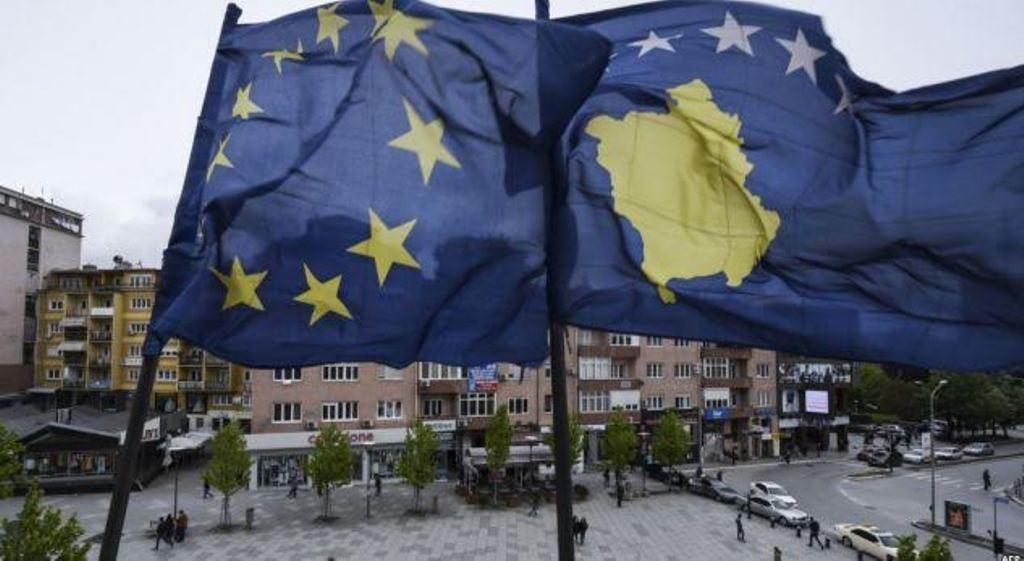
Independent Balkan News Agency (26 July 2018)
The European Commission has given a positive recommendation on visa liberalization for Kosovo citizens after more than 6 years since it had launched a visa liberalization dialogue with the last country that remains isolated in the region. Despite of the fact that Kosovo passports holders are closer than ever to being permitted to travel to Schengen zone visa-free, there is still a process that has to be completed, before such thing happens.
A Pristina-based think tank called the Balkans Policy Research Group assesses that Kosovo has 9 remaining steps to complete for visa liberalization even after it got the final green light from the European Commission, for fulfilling all of the visa liberalization benchmarks.
The EU Commission resumes the proposal for the visa liberalization for Kosovo.
- The first thing that has to be done towards the completion of the remaining process for visa liberalization for Kosovo is that the European Commission should send jointly the proposal to the EU parliament and the Council of Ministers.
- Upon the receiving the proposal, the European Parliament’s Committee on Civil Liberties, Justice and Home Affair – LIBE examines it, alongside with the report of the rapporteur Tanja Fajon.
- At the same time, the European Council will as well start the preparatory work after receiving the Commission’s opinion. The working parties, which are the Visa Working Group and the Working Party on the Western Balkans Region – COWEB will discuss the proposal at first. If they come to a broad consent upon its reviewal, then the proposal advances to the Committee of the Permanent Representatives – COREPER.
- Next comes the LIBE Committee, which votes by a simple majority on the report of the rapporteur and approves the recommendation for visa liberalization for Kosovo passport holders. At the same time, the Committee approves to open inter-institutional negotiations.
- At the level of COREPER, the Council adopts the negotiation position for inter-institutional negotiations (trilogues). On behalf of the Justice and Home Affair Council – JHA, COREPER adapts the position by qualified majority, though in practice no formal voting happens.
- The three EU Institutions then will carry inter- institutional negotiations, with the purpose of reaching an agreement on a package acceptable for both, the Council and the Parliament.
- European Parliament votes on the proposal for the amendment of the regulation (No. 539/2001). Kosovo will move under the Annex of visa free entities and territorial authorities that are not recognized as states by at least one member state, since four more EU countries have not recognized Kosovo yet, which are Cyprus, Greece, Romania,Spain and Slovakia.
- After the approval of the proposal at the Parliament, the European Council then adapts the change of the regulation (539/2001), by a qualified majority, which is a common voting system within the Council.
- The European Parliament and the Council of Ministers will then have to sign the final legal act.
- The signed legal act is published in the official journal of the European Union just three weeks after it is agreed. 20 days later the act comes into force, and the Kosovo citizens will be able to travel visa-free towards the Schengen Area.
Kosovo visa liberalization process compared to Ukraine and Georgia
Kosovo had started its visa liberalization dialogue in January 2012, while Georgia started the process just months later in June 2012. On the other hand, Ukraine had begun its dialogue in 2008. The citizens of both countries have been able to travel visa-free to Schengen for more than a year now, while Kosovo was struggling to fulfill one of the last two benchmarks, which is ratification of demarcation with montrenegro.
Both countries received positive recommendations on fulfilling all visa liberalization benchmarks on March and April 2016. The conciliation between the European Union institutions took place in the winter, December and February respectively. Georgiasigned visa liberalization with EU on March 2018, whereas Ukraine signed the agreement on June 2018.
If things go the same for Kosovo, its citizens may be able to travel visa free at the beginning of next summer.
http://balkaneu.com/9-steps-remain-for-kosovo-visa-liberalization-after-commissions-positive-recommendation/
No comments yet.
- JAPANESE PM REAFFIRMS WILLINGNESS TO RESOLVE TERRITORIAL ISSUE WITH RUSSIA Asia - Pacific 26.07.2018
- SERBIA FLOATS ETHNIC PARTITION IN SEARCH OF KOSOVO DEAL The Balkans 26.07.2018
- IRAQ’S ELECTRICAL GRID NEEDS FURTHER IMPROVEMENT Iraq 26.07.2018
-
 ENERGY, EU REFORM ON THE AGENDA AS MACRON HEADS TO SPAIN AND PORTUGAL
Europe - EU
26.07.2018
ENERGY, EU REFORM ON THE AGENDA AS MACRON HEADS TO SPAIN AND PORTUGAL
Europe - EU
26.07.2018
- TWO ISLAMIC STATE MILITANTS KILLED WHILE TRYING TO INFILTRATE INTO IRAQ’S BAIJI Iraq 26.07.2018
-
25.01.2016
THE ARMENIAN QUESTION - BASIC KNOWLEDGE AND DOCUMENTATION -
12.06.2024
THE TRUTH WILL OUT -
27.03.2023
RADİKAL ERMENİ UNSURLARCA GERÇEKLEŞTİRİLEN MEZALİMLER VE VANDALİZM -
17.03.2023
PATRIOTISM PERVERTED -
23.02.2023
MEN ARE LIKE THAT -
03.02.2023
BAKÜ-TİFLİS-CEYHAN BORU HATTININ YAŞANAN TARİHİ -
16.12.2022
INTERNATIONAL SCHOLARS ON THE EVENTS OF 1915 -
07.12.2022
FAKE PHOTOS AND THE ARMENIAN PROPAGANDA -
07.12.2022
ERMENİ PROPAGANDASI VE SAHTE RESİMLER -
01.01.2022
A Letter From Japan - Strategically Mum: The Silence of the Armenians -
01.01.2022
Japonya'dan Bir Mektup - Stratejik Suskunluk: Ermenilerin Sessizliği -
03.06.2020
Anastas Mikoyan: Confessions of an Armenian Bolshevik -
08.04.2020
Sovyet Sonrası Ukrayna’da Devlet, Toplum ve Siyaset - Değişen Dinamikler, Dönüşen Kimlikler -
12.06.2018
Ermeni Sorunuyla İlgili İngiliz Belgeleri (1912-1923) - British Documents on Armenian Question (1912-1923) -
02.12.2016
Turkish-Russian Academics: A Historical Study on the Caucasus -
01.07.2016
Gürcistan'daki Müslüman Topluluklar: Azınlık Hakları, Kimlik, Siyaset -
10.03.2016
Armenian Diaspora: Diaspora, State and the Imagination of the Republic of Armenia -
24.01.2016
ERMENİ SORUNU - TEMEL BİLGİ VE BELGELER (2. BASKI)
-
AVİM Conference Hall 24.01.2023
CONFERENCE TITLED “HUNGARY’S PERSPECTIVES ON THE TURKIC WORLD"









